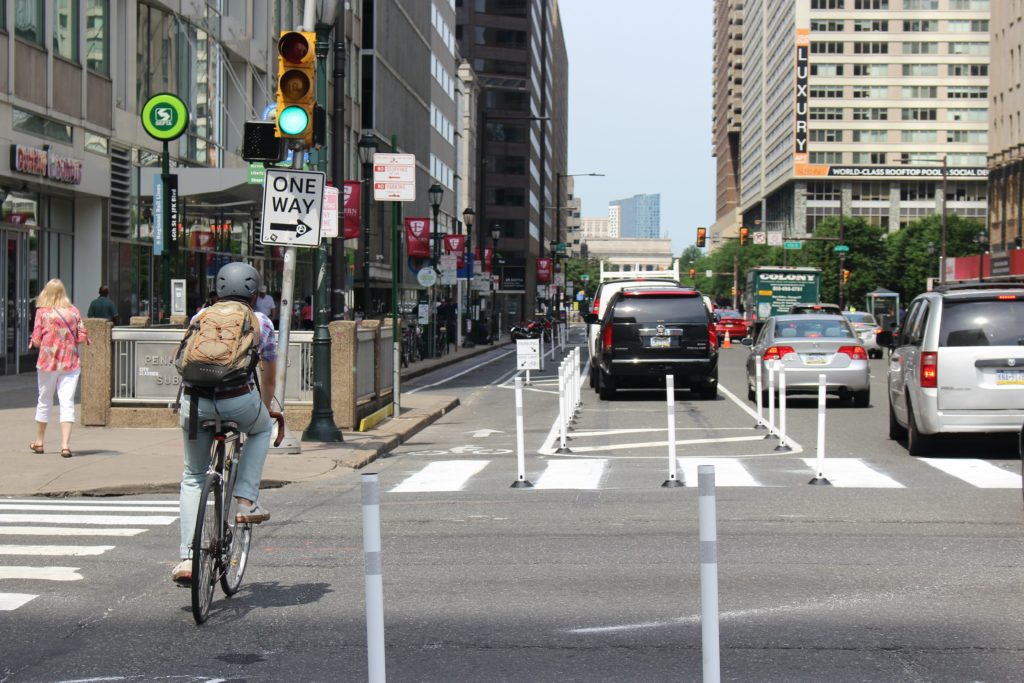Biking and Walking

Biking and walking are the most sustainable modes of transportation. Replacing a car trip with walking or biking directly reduces greenhouse gas emissions from transportation. Fossil fuels are the leading contributor to the climate crisis in the US, and immediate action like making it easier for people to bike and walk are critical. Fortunately, many car trips can easily be replaced with a short walk or bike ride.
In addition to being good for the environment, walking and biking benefit personal well being and social cohesion, and fewer car trips improve traffic safety. Active transportation options that are safe and enjoyable can replace vehicle trips, and offer the mental and physical health benefits of exercise and time to disconnect and enjoy your surroundings.
The Council promotes biking and walking through advocacy, planning, online resources, and shaping policies that prioritize pedestrians and cyclists over motor-vehicles. Poor road design that prioritizes vehicle speed and car dominant culture has created dangerous roadways that have led to a rise in pedestrian and bicycle fatalities. These safety concerns are a major barrier for people who could be riding or walking to their destination. The Council works to reduce traffic fatalities by promoting the installation of safe infrastructure that protect vulnerable road users and encourages people to transition to biking and walking.
Small changes like walking, riding a bike, and taking public transit instead of driving to your destination can make a big impact on air quality, and people are more likely to make the switch when they feel safe. The Council believes every resident in every neighborhood deserves to be able to safely walk, roll, or ride a bike without fear of being struck by a speeding car or sustain serious injury due to broken sidewalks or poor quality infrastructure. Make sure your elected officials know you support safe biking and walking infrastructure, and want projects approved and funded the prioritize safety over vehicle speed.
THE PROBLEM
Transportation is the largest source of carbon emissions nationally, and pollution from idling cars stuck on congested highways and other fossil fuel powered vehicles lowers the air quality for millions of people. The Council works to reduce motor vehicle travel by promoting sustainable modes, and supporting infrastructure upgrades and policy that promote walking and biking while ensuring cyclist and pedestrian safety.
The legacy of car-centric road planning has created dangerous conditions for pedestrians and cyclists, especially in cities and growing suburbs. Unfortunately, road safety is not equitable across the country. In Philadelphia, a disproportionate amount of fatalities occur in Communities of Color along the “High Injury Network,” the 12% of city streets where 80% of all traffic fatalities and serious injuries occur.
Bureaucratic processes slow down the implementation of safe infrastructure, especially bike lanes and traffic calming measures. Bad policies and a lack of funding create continued equity concerns, such as Philadelphia’s requirement for homeowners to pay for costly sidewalk repairs, which means real safety issues are left unresolved for long periods of time. In addition, available city services to address safety issues residents face in their neighborhoods are often underfunded, confusing, and difficult to navigate.
THE SOLUTION
Biking and walking has a big impact on our environment and our health. The Council works to make switching from cars to biking and walking easy and safe through public engagement, shaping policy, support for a volunteer pedestrian advocacy group, public events, and the use of the Council’s multimodal trip planning website and Android app GoPhillyGo.
- GoPhillyGo – The Council’s multimodal trip planning mobile site and Android app makes planning a walking, biking, and transit trip easy. Visit www.gophillygo.org to plan a sustainable trip to parks, trails, events, and more.
- Feet First Philly – The Council sponsors Philadelphia’s only advocacy group solely dedicated to protecting pedestrians rights. The volunteers meet regularly to plan advocacy campaigns, public walks with a theme, and to discuss policy issues that affect pedestrians. Visit www.feetfirstphilly.org to learn more and get involved.
- Cobbs Creek Trail – For years, the Council has guided the process to extend the Cobbs Creek Trail in West and Southwest Philadelphia to the John Heinz National Wildlife Refuge. The Council also works with residents in communities that surround the trail to ensure the public resource is inviting to neighbors, maintained well, and is a valued community resource.
- Love To Ride – The Council Partners with Love To Ride, a national cycling promotion organization, and hosts the Cycle September and Bike Month Challenges. The Council promotes Indego bike share as a great way of getting started cycling.
- Vision Zero – The Council works with other advocacy groups and city agencies to meet the goal of reducing traffic fatalities to 0. Traffic fatalities are preventable with better road design, and the goal of 0 deaths can be achieved with data driven approaches.
- Pedestrian Advocacy Guide – Feet First Philly and Clean Air Council created the online guide to help navigate city services and resources for addressing pedestrian safety issues in Philadelphia. Click here to learn more and to watch a tutorial video.
Circuit Trails – The Circuit Trails are a network that will eventually extend more than 800 miles of regional trails, and the Council promotes the expansion and use of these trails for recreation and as a safe route for cyclists and walkers to use to get to work and essential businesses.

